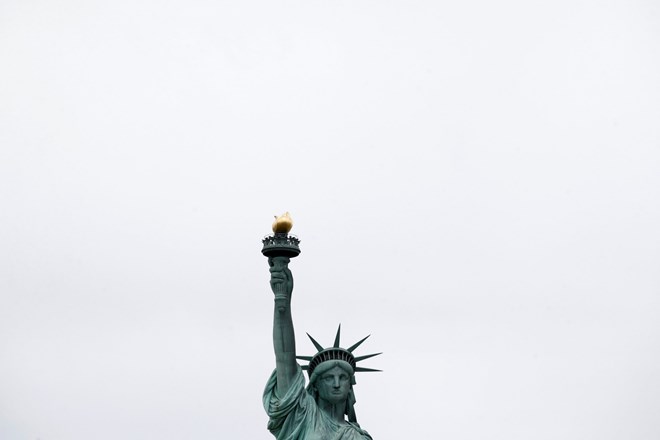
Richard Cohen
Tuesday April 25, 2017

The Statue of Liberty in New York. (Mike Segar/Reuters)
My friend, publicity-shy but otherwise admirable, has an odd way of spending his free time. He flies to some of the world’s most Godforsaken places and tries to help some of the world’s most Godforsaken people. This is how he got to the Dadaab refugee camp on the Somalia-Kenya border, a moonscape of sun-blanched trees adorned with errant plastic bags, where young men, such as the ones my friend encountered, until recently dreamed of America. No longer, though. “We are not wanted anymore,” one of the refugees said. “America is not a friendly place.” They said they’d prefer to go back to war-torn Somalia.
My friend was disbelieving.
“You’d rather go back to a war zone than go to America?” he asked.
“Yes,” the young man said. Yes, his friends nodded in agreement.
Their reason: President Trump.
My friend was both shocked and appalled. He is no naif. He has lived all over the world, worked in India and Afghanistan, and dealt with refugees from drought and refugees from famine and refugees from war. The Dadaab camp residents are mostly the latter, goat and camel herders escaping Somalia’s persistent civil war. Dadaab has some 245,000 residents, the numbers fluctuating with conditions. Drought brings more. Rain brings less.
The thought of America always brought hope. Trump, though, has repurposed the Statue of Liberty. Her upstretched arm no longer beckons. It is the “halt” of a border cop.
I am not the world traveler my friend is, but I know the exhilaration and pride of being an American in shambolic places where the sewers run free. My country is known — yes, for its power and sometimes for its alleged or actual crimes — but also for its presumed goodness, its quality of justice, its huge welcome: a country with open arms.
The America that lived in the minds of people around the globe was the great American empire, the one of aspiration, hope and decency, and the one that remained even as the physical one contracted. This is the one that mattered. It mattered to people overseas and to Americans themselves. We had a view of ourselves. We were good. We were generous. We were sometimes dumb and sometimes cruel, but these were uncharacteristic moments, like a flash fight in an otherwise good marriage. We were always ready to make up.
Now we have shown an ugly face to the world. It is Trump the pugnacious and Trump the intolerant and Trump the dishonest and Trump the angry and Trump the malevolent and, finally, Trump the ugliest of Americans. It is the Trump who has disheartened refugees and even discouraged tourism, which declined immediately after the late-January travel ban.
Never mind the loss of tourist dollars and never mind, too, lost tax revenue. What matters more is the loss of the image we used to have as a nation. I never knew what was meant by American exceptionalism, but surely it applied to the aura of specialness that one could sense abroad. My grandmother, an immigrant from the Polish shtetl, used to refer to it all the time. “Only in America,” she’d say over and over again. It was the immigrant’s common expression of wonder. What a place, America! What a people, Americans!
The Dadaab camp was established by the United Nations 25 years ago. It has become a considerable city, with even a bookstore and other amenities. Its residents live on U.N. assistance and contributions from hard-pressed Kenya. Conditions are harsh; the war is unending, yet life insists on its routines. One thousand children are born a month. Some young people have never known a different place.
But even there, as if on the rising haze from the heat or the dust blowing in from the desert, the image of Trump comes rolling in like yet another plague. The American visitors take comfort from the indomitability of the refugees and, inescapably, the dumb luck of their own fortunate birth.
They walk from group to group, inquiring, wondering, asking the usual questions and expecting the usual answers. But then they come to the group of young men whose views of America have changed. They no longer want to go there. It is not a friendly place, one of them said.
My friend calls Dadaab “a dead-end spot in the middle of nowhere.” You can Google it. It is a parched place. The trees cling to life, but the great American Empire of Hope is already dead.